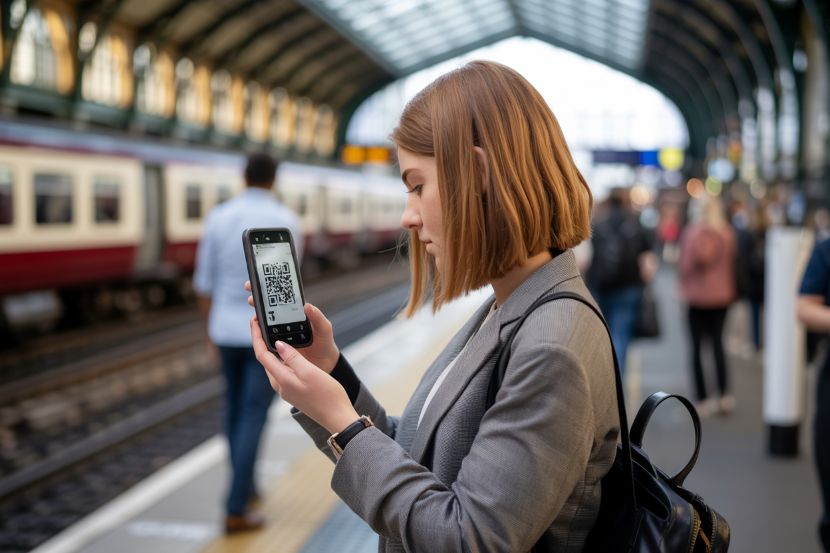Home » RAILWAY NEWS » England Trials Ticketless Pay-As-You-Go Rail Travel for Passengers: Here’s What You Need To Know
Published on
September 3, 2025
England has launched a pay-as-you-go rail system that ditches paper tickets altogether in an effort to make rail travel easier. Using GPS, the system monitors your journey from start to finish and charges you the cheapest fare possible, based on the distance and the time you’ve actually travelled. The pilot began on 1 September 2025 and runs across the East Midlands, covering the core Leicester, Derby and Nottingham routes. The scheme supports the UK government’s wider programme to upgrade the rail network and enhance the passenger experience.
A Revolutionary Step for UK Rail Travel
Passengers participating in the trial will use a mobile app that tracks their location via GPS. The system will automatically calculate the most cost-effective fare based on their travel for the day, ensuring that passengers are charged fairly without the need for paper tickets. If multiple journeys are made, the app will even calculate if a season ticket would have been cheaper, making this new system a truly flexible option for commuters and occasional travellers alike.
With the Department for Transport’s £1 million investment in these trials, this pay-as-you-go model seeks to streamline rail travel, eliminating the confusion surrounding traditional ticketing systems. Rail Minister Peter Hendy stressed that the rail ticketing system in the UK had become overly complex, making the need for an upgrade long overdue. This trial aims to make rail travel easier, more flexible, and accessible to a wider range of passengers.
Expanding the Trial Across the UK
This new technology, already in use in countries like Switzerland, Denmark, and Scotland, is now being trialled for the first time in England. The trial in the East Midlands will involve 1,000 passengers and is expected to provide valuable data to improve the system. Following its success, the trial will expand to include rail services in Northern England by the end of September, including routes through Leeds, Sheffield, and Doncaster.
In Scotland, a similar trial has been running in Glasgow and the Strathclyde area since January, further showcasing the potential of GPS-based rail fare systems across the UK. With these trials, the UK government aims to reduce the complexity of the current ticketing system and make travel easier for everyone, from regular commuters to tourists exploring the country.
How It Works for Passengers
The new ticketing system uses GPS technology to track passengers’ locations and calculate the best fare at the end of the day. This means that instead of buying tickets for each individual journey, passengers will only pay for the total distance they travel. The app generates a barcode for ticket inspection and for passing through platform barriers, ensuring smooth and efficient access to the trains.
This system is designed to replace the need for paper tickets, which have often been a barrier for passengers. The app will also give passengers the ability to choose the most cost-effective options, including seasonal passes or discounts, depending on their travel patterns.
A Mixed Reaction from Passengers
Although the new system has garnered support from many passengers, there have been some concerns. Some travellers feel that the focus should first be on improving the basics of rail travel, such as better air conditioning and cleaner carriages, rather than introducing new digital systems. Others, like Rebecca Butler, expressed that they liked the idea but weren’t sure how it would work for those travelling with children or dependents.
Despite these concerns, industry experts remain optimistic about the potential benefits. Natasha Grice, director at Transport Focus, praised the trial as a great opportunity to use digital technology to improve the passenger experience. The trial is expected to provide valuable data on how passengers interact with the system and whether it could become a standard feature across the UK rail network.
Impact on UK Rail Travel
The pay-as-you-go trial is an essential part of the UK government’s wider plan to modernise the national rail system. One of the government’s main objectives is to simplify and standardise the ticketing process, making travel more flexible for all passengers. This trial is expected to provide valuable insights into the future of rail travel in the UK, with the potential to expand to other regions in the coming years.
By testing the system in key regions like the East Midlands and Northern England, the government hopes to create a seamless travel experience that could eventually become the standard for UK rail travel. If successful, the scheme will likely encourage more people to use trains, reducing congestion on roads and contributing to the UK’s sustainability goals.
A Simplified and Flexible Future for UK Rail Travel
The newly launched pay-as-you-go scheme for ticketless intraday rail travel in the East Midlands represents a major leap in the UK rail modernisation effort. Passengers’ devices link taxi-style GPS to instant fare calculation, allowing them to board without a paper, card, or onboard validation. Computer-controlled journey histories and automatic deductions produce a seamless journey the moment people step off the train. Scheduled de-brief of the findings in four months’ time will inform a similar roll-out across Northern England, already being prepped for 2023. If the set pilots scale, rail travel may no longer include time-wasting ticket buying or potentially pricey rebates, paving the way for boarding to anywhere, anytime, fee later.
